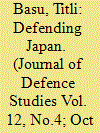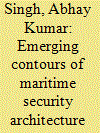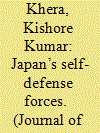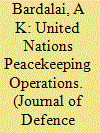| Srl | Item |
| 1 |
ID:
163384


|
|
|
|
|
| Summary/Abstract |
Three key developments unfolded in Japan in August 2018: the Ministry of Defence (MOD) released its annual Defence White Paper; requested a 2.1 per cent increase in the 2019 budget; and instituted an Exploratory Committee on the Future of Self Defence Forces (SDF) with the objective of reviewing the current National Defence Program Guidelines (NDPG) and the Mid-Term Defence Program (MTDP). The subsequent consolidation of political strength in September 2018 at the Liberal Democratic Party’s (LDP) presidential election extended Prime Minister Shinzo Abe’s tenure till 2021. Analysing these developments in the backdrop of Prime Minister Abe’s top priorities—managing the United States (US)-Japan alliance under the Trump Presidency and delivering on the ‘great responsibility’ of redefining Japanese post-war security orientation—unpacks Tokyo’s key challenges. These are, essentially, balancing between sharing greater burden within the alliance framework to ensure regional security on one hand, and weighing regional sensitivities and deeply fractured domestic constituencies on the other.
|
|
|
|
|
|
|
|
|
|
|
|
|
|
|
|
| 2 |
ID:
163382


|
|
|
|
|
| Summary/Abstract |
The revival of the centuries-old ‘Silk Road at Sea’ into a 21st Century Maritime Silk Road (MSR) is an integral part of China’s ambitious Belt and Road Initiative (BRI). The Chinese White Paper on its vision for enhancing maritime cooperation broadly confirms this perception, since it considers maritime security assurance as the lynchpin of MSR initiatives. As its trade and overseas economic interests have been constantly growing, Beijing’s strategic concern about protection of these interests has magnified. This article argues that through the assurance of maritime security under a cooperative framework as an ‘international public good’, China, via the expansion of its maritime influence in the IOR, aims to play a proactive role in shaping the maritime strategic environment.
|
|
|
|
|
|
|
|
|
|
|
|
|
|
|
|
| 3 |
ID:
163383


|
|
|
|
|
| Summary/Abstract |
Japan banks heavily on her security alliance with the United States (US) to ensure availability of requisite military capability in the region. China’s economic and military capabilities have grown in the last two decades, closing the gap with the US. With diminishing differential, especially with respect to China, the US’ deterrence power has gradually declined. Under these conditions, Japan has to develop Self-Defense Forces (SDF) capabilities to ensure that it, in combination with its alliance partner, the US, is able to meet national security challenges. In a major shift in security policy, on 9 January 2007 Japan’s Parliament approved the upgradation of Defense Agency/SDF to a full-fledged ministry. However, the changes in the SDF, especially in its doctrine and roles, have been gradual. Till SDF graduates to have an offensive capability that can deter capably, the US will continue to be a key player in Japan’s security milieu.
|
|
|
|
|
|
|
|
|
|
|
|
|
|
|
|
| 4 |
ID:
163381


|
|
|
|
|
| Summary/Abstract |
Decades after the deployment of the first peacekeeping operation (PKO)—United Nations Truce Supervision Organization (UNTSO)—in 1948, the United Nations (UN) cannot boast of too many successes. The continued relevance of UN PKOs has thus come under criticism. In order to determine whether UN PKOs are still relevant, it is necessary to obtain a clear understanding of the reasons/factors for their success and failure, and thereafter assess their performance. Based on the author’s personal experience of peacekeeping and prior research, this article seeks to highlight a few factors that have an overriding influence on the outcome of a PKO. The article also attempts to provide a perspective on the relevance of the PKO in context of the challenges they face regarding planning, deployment and execution of such operations.
|
|
|
|
|
|
|
|
|
|
|
|
|
|
|
|